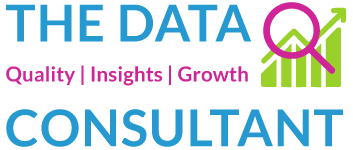Growth Strategy

A well-aligned data strategy is essential for driving business success. At The Data Consultant we specialise in helping businesses develop customised data strategies that align with their business goals and objectives. Whether you’re looking to optimise resources, streamline processes, or improve decision-making, we’ve got you covered.
“Data should not drive your strategy; your strategy should drive your data.”
Bernard Marr, Author and Data Expert
Why Align Your Data Strategy with your Business Strategy?
Strategic Focus:
Organisations with aligned data strategies are 58% more likely to report successful outcomes from their data initiatives (Harvard Business Review).
Increased Efficiency:
By ensuring that your data strategy is closely aligned with your business goals, you can optimise resources, streamline processes, and eliminate redundancies.
Improved Decision-Making:
When data strategy is aligned with business strategy, decision-makers have access to timely, relevant, and accurate data to inform their choices, leading to better outcomes and reduced risk.
Enhanced Agility:
A well-aligned data strategy enables organisations to adapt quickly to changing market conditions, emerging trends, and evolving customer preferences.
Everything we do at The Data Consultant has a focus on using data for business growth. Our Founder, Tracey O’Neill has a unique blend of commercial experience and data analytics expertise and is passionate about ensuring that data activities deliver to the bottom line for our clients.
We can offer once off or ongoing consultancy services in the following areas:
Strategic Planning:
We work closely with you to align your data strategy with your business objectives, ensuring that every data initiative contributes to your overarching goals.
Data Governance:
Implement robust data governance frameworks to ensure the integrity, security, and compliance of your data assets while supporting your strategic objectives.
Technology Integration:
Leverage cutting-edge technologies and tools to seamlessly integrate data into your business processes and systems, enabling real-time insights and informed decision-making.
Continuous Optimisation:
Regularly assess and refine your data strategy to ensure alignment with evolving business priorities and market dynamics.
Data Driven Culture
In today’s rapidly evolving business landscape, organisations that harness the power of data have a competitive edge. But it’s not just about collecting data – it’s about cultivating a culture that values data-driven decision-making at every level.
Why Foster a Data-Driven Culture?
Competitive Advantage:
Companies with a strong data-driven culture are 3 times more likely to report significant improvement in decision-making and business outcomes (Forrester Research).
Innovation:
Data-driven organisations are more innovative and agile, leveraging insights to identify new opportunities and stay ahead of market trends.
Employee Empowerment:
Empowering employees with data, leads to higher job satisfaction and performance. According to a survey by MIT Sloan Management Review, 72% of employees at data-driven companies report feeling more engaged in their work.
Customer Satisfaction:
By understanding customer behaviour and preferences through data analysis, businesses can deliver more personalised and impactful experiences, leading to increased customer satisfaction and loyalty.
Data Driven Culture Workshop
Book your data driven culture workshop here:
10 steps to creating a Data Driven Culture:
Leadership Commitment:
Leadership must champion the importance of data-driven decision-making and allocate resources to support initiatives.
Education and Training:
Provide training to employees on data literacy, analytics tools, and interpretation of data.
Infrastructure:
Invest in the necessary technology infrastructure, including data storage, analytics tools, and visualisation platforms.
Data Quality:
Ensure that data collected is accurate, reliable, and relevant to the organisation’s goals.
Clear Objectives:
Define clear objectives for using data to drive decision-making and align them with the organisation’s overall strategy.
Collaboration:
Encourage collaboration between departments to share data, insights, and best practices.
Incentives:
Provide incentives for employees to use data in their decision-making processes and recognise those who demonstrate proficiency in data analysis.
Continuous Improvement:
Continuously evaluate and refine data processes and strategies based on feedback and results.
Cultural Shift:
Foster a culture where data is valued and used to inform decisions at all levels of the organisation.
Communication:
Communicate the benefits of a data-driven approach and celebrate successes to reinforce its importance within the organisation.
